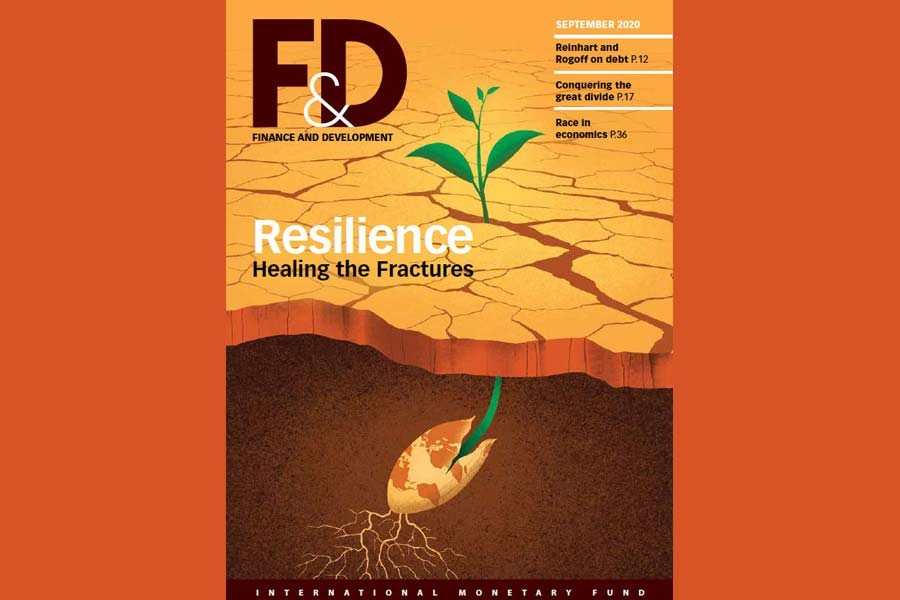The cover-story of the September issue of 'Finance & Development' - the prestigious quarterly journal of International Monetary Fund (IMF) has attracted the attention of many. Titled 'Resilience: Healing the Fractures', it examines the very structure of the global economy toward a future that is more resilient, implying a more equitable world with greater adaptability and sustainability. Two of the articles in the journal deserve special mention because of their intricate relevance for both the developed and developing world. These are 'Rethinking Global Resilience' by the Oxford academic Ian Goldin, and 'Conquering the Great Divide' by the Nobel Prize-winning economist Joseph Stiglitz.
Ian Goldin refers to the 'butterfly defect' of globalisation - the systemic risks endemic to a hyper-connected world, where small actions at one place can spread rapidly to exert global repercussions. While defining 'butterfly defect', he claims that the super-spreaders of the good of globalisation - airport hubs, fibre-optic cables, and global financial centres - are also the super-spreaders of the bad. The calamities generated by the Covid-19 pandemic, the escalating climate change effects, as well as the financial crises of 2008 and 2020 only point to the need for urgent reforms for taming the butterfly defects of globalisation. These networked threats demand changes in all parts of the system beginning with behaviour at the individual level to institutional, national, regional and international planes. Resilience cannot be merely delegated to others, and everyone has a responsibility to promote and strengthen it.
The global financial, digital, trading and other systems are intertwined through intricate networks. The inter-connected nodes and hubs are located in particular spots like the global financial centres, major sea and air ports. The existence of logistic or other nodes at one place makes them vulnerable, as does the concentration of vital personnel and information in headquarters. Resilience can therefore be strengthened through greater geographic diversification as well as by relating with competition policies and risk management strategies.
Resilience can also be bolstered through decentralisation, where individuals, businesses and nations are empowered to take own decisions. Proper risk management requires countries to grant some autonomy to supranational institutions. The critical importance of operating at multiple levels to contain risks as well as the need for strong international, national, sub-national and local actions have been demonstrated through stark variations in the management of Covid-19 by different countries of the world.
The devastations caused by the pandemic should propel mankind to redouble efforts for building a fairer and more equitable world. That would require addressing the threats that exacerbate poverty, inequality and climatic disasters. Concerted action by all is required for promoting a resilient and sustainable future for mankind, starting from the individual to the global levels. Cooperation and collaboration is needed not only between governments, but also between civil societies, businesses and professionals. As networked problems require networked solutions, the present crisis should be utilised for building newer and stronger bonds among communities and nations across the globe.
In his article, Stiglitz has emphasized writing new rules for the new economy in order to conquer the great divide that has been laid bare by the pandemic. But the comprehensive program needed to reduce income inequality should recognize that the century-old competitive equilibrium model whereby producers maximise profit, consumers maximise utility, and prices are determined based on demand and supply in competitive markets does not provide a good economic framework, especially for understanding the growth of inequality. In an economy where market power and exploitations dominate, the rules of the game matter. Weaker constraints on corporate power, reduction in the bargaining power of workers, and erosion in rules governing the exploitation of consumers, borrowers and workers have all led to poorer-performing economies marked by higher rent-seeking and worsening inequality.
Stiglitz therefore calls for rewriting the rules of the economy. For example, monetary policy should be focused more on full employment of all groups instead of inflation. Bankruptcy laws should be more balanced and replace those that are excessively credit-friendly and elicit too little accountability from bankers engaging in predatory lending. And corporate governance laws should recognize the importance of all stakeholders - not merely the shareholders. The rules of globalisation should not merely serve corporate interests, the interests of workers and the environment should also be upheld. The labour laws would do a better job in protecting workers by according greater opportunities for collective actions.
But the sought-after equality and solidarity will not materialise in the short run even after these measures are taken. Not only the market distribution of income needs to improve, its redistribution is also critical. This is because some countries with the highest degree of market income inequalities actually have regressive tax systems, where smaller shares of income are paid by the top earners compared to workers lower down the hierarchy.
Stiglitz cautions that the current pandemic could not be controlled unless it is controlled everywhere, and the economic slump cannot be reversed until there is a strong global recovery. Therefore, it is a matter of self-interest as well as humanitarian concern for the developed countries to offer assistance to developing economies. Without this global solidarity, the pandemic will persist longer, global inequalities will grow, and there will be global divergence in the shape of rising disparities between and within countries. He also warns that the pandemic may cause a surge in debt crisis, as low interest rates in advanced economies have pushed up loans, and reckless borrowings in emerging cum developing countries have led to more debts than can be serviced.
In the above backdrop, there is an urgent need for greater global solidarity for addressing the cleavages across countries, which is likely to worsen the existing inequalities and cause long-lasting scars. However, the post-pandemic hyper-networked world can be transformed for the better if the countries radically reset their social and economic lives through policies that invest in the people and promote a shared sense of destiny as human beings.
The writer is a retired Additional Secretary and former Editor of Bangladesh Quarterly.


